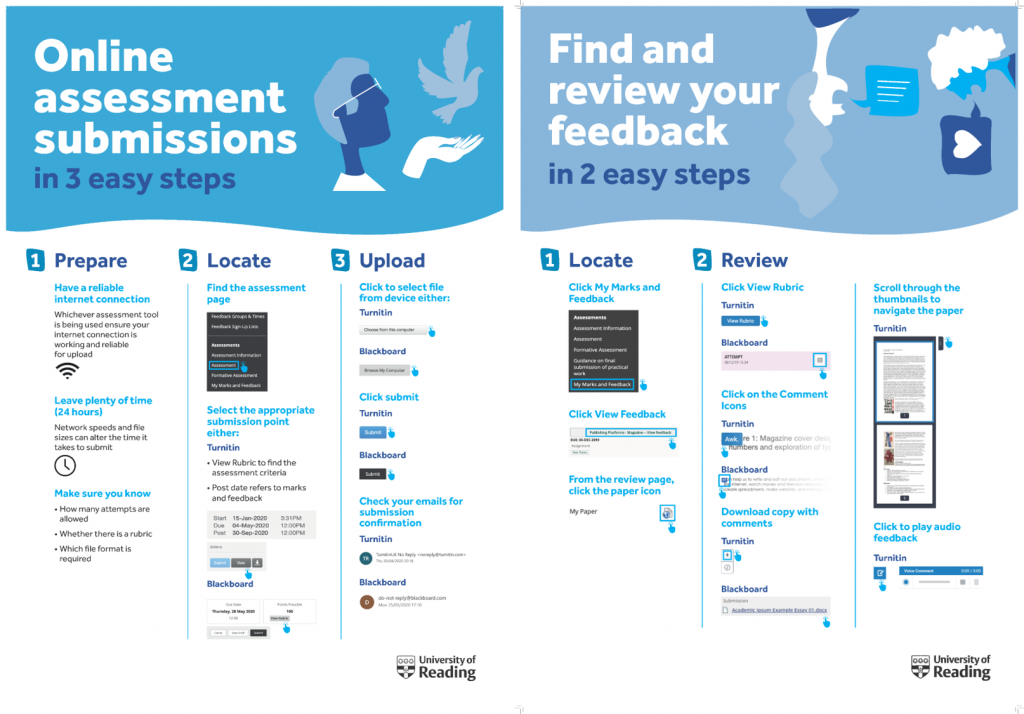Madeleine Davies, Cindy Becker and Michael Lyons- SLL
Overview
A feedback audit and consultation with the Student Impact Network revealed a set of practices DEL needs to amend. The research produced new student-facing physical and online posters, designed by a ‘Real Jobs’ student, to instruct students on finding their feedback online, and generated ‘marking checklists’ for staff to indicate what needs to be included in feedback and what needs to be avoided.
Objectives
- To assess why students scored DEL poorly on feedback in NSS returns
- To consult with students on types of feedback they considered useful
- To brief colleagues on good practice feedback
- To produce consistency (but not conformity) in terms of, for example, the amount of feedback provided, feedforward, full feedback for First Class work, etc.
- To assess whether marking rubrics would help or hinder DEL feedback practice
Context
The ‘DEL Feedback Action Project’ addresses the persistent issue of depressed NSS responses to Department of English Literature assessment and feedback practices. The responses to questions in ‘teaching quality’ sections are favourable but the 2018 NSS revealed that, for English Studies, Reading is in the third quartile for the ’Assessment and Feedback’ section and the bottom quartile for question 8 (scoring 64% vs the 74% median score) and question 9 (scoring 70% vs the 77% median score).
In October 2018, DEL adopted eSFG. An EMA student survey undertaken in January 2019 polled 100 DEL students and found that, though students overwhelmingly supported the move to eSFG, complaints about the quality of DEL feedback persisted.
Implementation
Michael Lyons began the project with an audit of DEL feedback and identified a number of areas where the tone or content of feedback may need improving. This material was taken to the Student Impact Network which was shown anonymised samples of feedback. Students commented on it. This produced a set of indicators which became the basis of the ‘marking checklist’ for DEL staff. Simultaneously, DEL staff were asked to discuss feedback practice in ‘professional conversations’ for the annual Peer Review exercise. This ensured that the combined minds of the whole department were reflecting on this issue
Student consultation also revealed that many students struggle to find their feedback online. With this in mind, we collaborated with TEL to produce ‘maps to finding feedback’ for students. A ‘Real Jobs’ student designer converted this information into clear, readable posters which can be displayed online or anywhere in the University (the information is not DEL-specific). The posters will be of particular use for incoming students but our research also suggested that Part 3 students are often unaware of how to access feedback.
The results of the initial audit and consultation with students indicated where our feedback had been falling short. We wrote a summary of these finding for DEL HoD and DDTL.
Research into marking rubrics revealed that DEL marking would not be suited to using this feedback practice. This is because they can be inflexible and because DEL students resist ‘generic’ feedback.
 Impact
Impact
The student-facing posters and staff-facing ‘marking checklist’ speak to two of the main issues with DEL feedback that were indicated by students. The latter will deter overly-brief, curt feedback and will prompt more feedforward and comment about specific areas of the essay (for example, the Introductory passage, the essay structure, referencing, grammar, use of secondary resources, etc).
With DEL staff now focused on the feedback issue, and with students equipped to access their feedback successfully, we are hoping to see a marked improvement in NSS scores in this area in 2020-21.
For ‘surprises’, see ‘Reflections’.
Reflections
The pressure on academic staff to mark significant amounts of work within tight deadlines can lead to potential unevenness in feedback. We are hoping that our research prompts DEL to streamline its assessment practice to enhance the quality and consistency of feedback and feedforward.
Students’ responses in the Student Impact Network also suggested that additional work is required on teaching students how to receive feedback. Over-sensitivity in some areas can produce negative scores. With this in mind, the project will terminate with an equivalent to the ‘marking checklist’ designed for students. This will remind students that feedback is anonymous, objective, and intended to pave the way to success.
Follow up
Monitoring NSS DEL feedback scores in the 2020-21 round, and polling students in the next session to ensure that they are now able to access their feedback.
Continuing to reflect on colleagues’ marking workload and the link between this and unconstructive feedback.